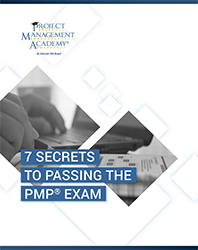
Do a quick search on almost any online job board, and you'll see that the majority of available project manager positions list "PMP certification" as either required or strongly preferred. In many companies, PMP certification is required for promotions or is connected to performance evaluations. Whether you are a project manager seeking a new job, or a hiring manager with available project management positions, you know how much weight the Project Management Professional (PMP)® certification carries in the workplace.

According to the Anderson Economic Group, approximately 1.2 million new project manager positions will need to be filled each year until 2016. But in many cases, applicants without a PMP credential won't even be considered. According to Kevin Archbold, a consulting manager at Key Consulting, "many recruiters divide their resumes into two piles: those with PMP certification and those without." He goes on to add that "today there are enough good project managers with their PMP certifications that recruiters don't have to sift through the uncertified ones."2
This article examines reasons why the PMP certification is so desirable in today's job market and business environment.
I. Customers are demanding PMP certification from their vendors.
Whether one believes in the intrinsic value of PMP certification or not, the economic reality is many major companies and entities are simply demanding it. If your company has bid on a government project over the past several years - be it federal, state or local, you likely encountered the PMP certification requirement. But this requirement is by no means limited to government entities. In a 2010 article for CIO.com, Steve DelGrosso, director of IBM's Project Management Center of Excellence, summed up the customer demand for PMP credential holders is as follows:
The marketplace in the U.S. is demanding the PMP certification or other project management certification. Going back five or six years, IBM has seen requests for proposals where the clients are demanding certified project managers be part of the proposal. If you can't present a certified project manager on their deal, they won't consider you.3
DelGrosso went on to note that, as of 2010, 14,000 of IBM's 25,000 project managers were certified, and that number was growing. "The best project managers inside IBM are certified project managers," he added.4
For certain types of firms, their entire business approach requires adherence to strictly-defined processes, so a PMP credential is a must. "Highly regulated industries (e.g., financial services, pharmaceuticals, defense and aerospace) wouldn't consider anyone without [the PMP] certification," says Tim Wasserman, Program Director of Stanford's Advanced Project Management Program. 5. If customers are demanding PMP certification holders for projects they hire out, organizations seeking these contracts must naturally have PMP credential holders on board (and the more the better).
II. Having your PMP certification shows you speak the common language.

David Wakeman, a PMP credential holder and director at the Employment Support Center, summed it up as follows: "Having an understanding of an accepted project management framework gives me the opportunity to speak with and communicate with clients and vendors on a level playing field."6 This sentiment has been repeatedly echoed by various Project Management Academy clients. For one such client - a U.S. military entity - the driving force behind its PMP certification effort was to harmonize its processes and communications with those of its major vendors (whose key personnel were required to be PMP credential holders).
While learning the lingo may seem to some like putting form over substance, think of how easily projects go awry based on communications failures. While having a team full of PMP credential holders will not eliminate the possibility of miscommunications, it will drastically reduce the chances because there is a common understanding of what each process and technique seeks to achieve.
III. Achieving your PMP certification shows that you are motivated and goal oriented.

Earning your PMP credential requires a substantial amount of time, energy and focus, in addition to your normal work and family obligations. You must manage your time well, and be able to manage some extra stress in your life. Many people will tell you the PMP exam was the hardest test they have ever taken. If it was not challenging, the certification would carry very little weight. If you are someone who willingly undertakes this challenge, especially while working full time, then you deserve to be recognized because you have gone above and beyond your normal obligations. Of course, having mastered the best practices set forth by PMI, you can also bring substantive value to any organization.
IV. Your PMP certification shows you can manage projects in a structured and repeatable fashion.
As project managers, we have learned to expect the unexpected. All projects are filled with unknowns, and our ability to manage in an ever-changing environment is paramount. But while every project is different, there is undeniable value in using a set of standardized, repeatable processes that have been endorsed by project management experts around the world.
The need for standardized project management techniques and processes is underscored by the increase in collaboration among businesses in today's economy. In its 2013 Pulse of the Profession™ Study, PMI addressed the increased need for standardization of processes in light of this trend.7 It found support for its position in, among other things, the 2012 IBM CEO Study which found that 53% of chief executives innovate with partner organizations. Naturally, when two organizations team up on a project, a common set of processes and techniques becomes vital.
Take risk management for example. This is obviously not an area where you want to re-invent your approach (or try to blend multiple approaches) for each project. Of course your risks will differ in each case, and your responses will as well, but the way you go about identifying and analyzing risks should not. Using the processes, tools and documents endorsed by PMI, you can effectively and confidently manage risk in any project. What's more, you can make sure your team members and partner organizations are always on the same page with regard to the risk identification and management approach.
V. Achieving your PMP certification shows you are an intelligent person.
If nothing else, employers know the PMP exam is difficult. For a multiple-choice test, it does a very good job of testing your judgment and decision-making ability. Moreover, it tests your reading comprehension and attention to detail - both important traits for any successful professional. So just by passing the exam, you have set yourself apart from others who don't have the certification.
According to Mark Langley, president and CEO of the Project Management Institute (PMI)®, the overall pass rate on the PMP exam was between 60-75% in 2010. While details about the exam content are closely guarded, general feedback suggests the exam has become substantially more difficult in recent years, particularly following the release of A Guide to the Project Management Body of Knowledge (PMBOK® Guide) - Fifth edition. Even using the best prep course, you must put forth substantial effort on your own to master the information before sitting for the exam.

But while these traits are all very important, they are merely foundational in nature. They need to be expanded upon, and the PMP certification is an excellent way to do that. Speaking a common language and following a structured set of processes adds real business value to these core skills, by creating an environment where innovation and collaboration can occur more efficiently and with far less risk.
At the end of the day, the PMP credential is a huge value-add. This business reality trumps any arguments to be made against the need for PMP certification. Many major players in today's economy are demanding it from their vendors and business partners, so organizations and employees cannot afford to buck the trend if they wish to stay competitive.
To learn more about Project Management Academy's PMP certification training, click here.


 New Horizons
New Horizons
 Project Management Academy
Project Management Academy
 Six Sigma Online
Six Sigma Online
 Velopi
Velopi
 Watermark Learning
Watermark Learning
 Login
Login





 New Horizons
New Horizons
 Project Management Academy
Project Management Academy
 Velopi
Velopi
 Six Sigma Online
Six Sigma Online
 Watermark Learning
Watermark Learning